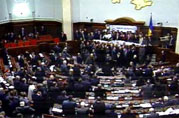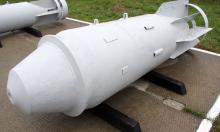Ukrainian parliament changes national laws
Ukraine becomes parliamentary and presidential republic

Deputies of the Ukrainian parliament, known as the Supreme Rada, held a special session on Wednesday, during which they passed several draft laws to eliminate the political crisis in the country. Four hundred and two deputies voted for the documents, whereas the minimum number of votes was 300. 
The draft laws will virtually make Ukraine become the parliamentary and presidential republic. According to the changes made to the national Constitution, the parliament will be responsible for forming the government, the authorities of which will be extended to five years. Four hundred and fifty deputies of the parliament will still be elected on the direct voting basis. The Supreme Rada will be entitled with appointing the prime minister and ministers, except for defense officials, the candidacies of which will be presented to the parliament by the president. The government will be formed on the base of the parliamentary majority coalition. It is worth mentioning that the above-mentioned changes will come into effect from 1 September 2005.
In addition, Ukrainian deputies made some changes to the election law to legalize the run-off election of December 26th (the repeated voting will take place on this date according to the decision of the Ukrainian Supreme Court). The changes touched upon the process of the absentee ballots voting too, for the opposition had a lot of complaints regarding the issue. Viktor Yushchenko's followers failed to ban the use of absentee ballots, although they did manage to toughen the control over the absentee voting, at least in theory.
In conclusion, the Ukrainian parliament dismissed the Central Election Committee board and approved new members.
Members of all factions of the Ukrainian Supreme Rada participated in the long debate, which took place prior to the parliamentary voting on the above-mentioned questions. The changes were supposed to be made on Tuesday, although the long discussions made it impossible. The decision-making process in the parliament on Wednesday, however, was rather smooth. It is noteworthy that the opposition demanded the resignation of the Ukrainian Prosecutor General, Gennady Vasiliev. The problem was solved rather quickly: President Leonid Kuchma accepted the prosecutor's resignation, the voting took place, and the president signed the approved draft laws.
Yulia Timoshenko, prominent on the Ukrainian political opposition, announced her intention to protest against the parliament's amendments to the Constitution. She stated that it would be very hard for Viktor Yushchenko to establish law and order in the country on such new laws: “It was Leonid Kuchma's triumph in the parliament. He used his powers, his political influence and obtained the decision that he and his clan needed,” Timoshenko said.
It is quite possible, though, that Yulia Timoshenko, whose name appears and disappears on Iterpol's wanted list, is rushing to a conclusion. Winning 300 deputies will be the only problem for the opposition to overcome, when Yushchenko becomes the new Ukrainian president. Viktor Yushchenko, however, is not the president yet, and it is not known if he becomes one.
The majority of the opposition rejoiced at the decision that the Ukrainian parliament made as a result of yesterday's meeting. When the meeting was over, deputies urged the opposition to stop blockading governmental headquarters and holding actions of protest on the Independence Square in Kiev.
Subscribe to Pravda.Ru Telegram channel, Facebook, RSS!





